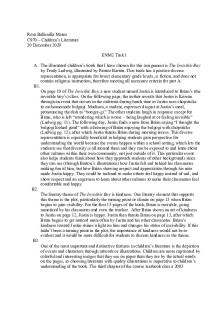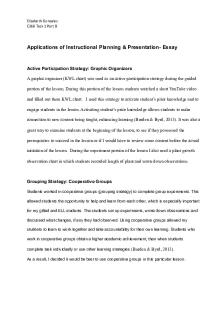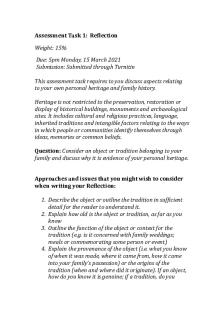Performance Assessment Task 2 PDF

| Title | Performance Assessment Task 2 |
|---|---|
| Author | Serena Christian |
| Course | Professional Roles and Values |
| Institution | Western Governors University |
| Pages | 4 |
| File Size | 67.9 KB |
| File Type | |
| Total Downloads | 58 |
| Total Views | 197 |
Summary
Performance Task 2...
Description
Task 2
Performance Assessment: Task 2 Serena Christian Western Governors University March 11, 2021
Task 2
A1: Response to Scenario First, I would strongly encourage Mr. Newcomb to have open communication with his wife and tell her himself that he was busy. My duty is to my patient though. With that said, I would either confirm that or mention to Mrs. Newcomb that Mr. Newcomb would be busy the following day. I would not seek her out, call her, or go out of my way to tell her he was busy. A2: Application of Patient Principles According to the International Council of Nurses (ICN) Code of Ethics, the nurse’s primary professional responsibility is to the people requiring nursing care. In this scenario, Mr. Newcomb is my primary responsibility. He is the one that requires the nursing care. From what is gathered from the scenario, even though he is nearing his death bed, Mr. Newcomb is competent adult. He is able to practice autonomy. Autonomy is defined by Cherry and Jacob (2019), as the principle of respect for a person, their right to self-determination, and the freedom to decide what they choose. Nonmaleficence is a little more difficult to defend. It is the duty to not inflict harm (Cherry & Jacob 2019). I would not be inflicting any harm by doing as Mr. Newcomb asks, or participating in what he asks, but I could potentially be complicit in inflicting harm to his wife if she found out. I ultimately chose to side with what my patient asked of me as he is my primary responsibility by practicing beneficence, the act of doing good to others. My act of good would be doing what Mr. Newcomb asked so he is able to die at peace by seeing his mistress. Justice is defined by Cherry & Jacob (2019) as “the equal and fair distribution of resources, regardless of other factors.” If I were to base my decision on this principle alone, I would not agree to say anything to Mr. Newcomb’s wife as my interpretation of this principle is to treat all equally. If my primary responsibility would not be just to Mr. Newcomb but also his wife, I would also need to follow the ICN’s Code of Ethics and apply them to his wife also. A3: Personal Beliefs and Values I do not believe in lying, which is why I said I would strongly encourage Mr. Newcomb to have open communication with his wife. Open and honest communication can clarify a lot of miscommunication and misunderstandings. It also can lead to better understanding of the other person and even yourself. As for the fact that he has a mistress, that bothers me only to a point. It all depends on his understanding of the term mistress. In general, a mistress is generally defined as a sexual partner of a married man and his wife is unaware of it. It is in that instance that it would bother me as he is hiding it and/or lying. In some other instances, a mistress can be known about by
Task 2
the married partner. In rare times, it can even be encouraged by the wife. Sometimes, the wife may know about it and doesn’t say anything and “allows” it to happen, even though the husband is unaware that his wife knows he has a mistress. The given scenario does not given any indication as to if she knows about it or not. A4: Promoting Self-Care Strategies There are many self-care strategies listed in an AORN journal publication (Ross, et al. 2017) that a nurse can perform to increase their physical and emotional health. These strategies can be beneficial to anyone, not just nurses. They include healthy diet, increased activity, healthy relationships, stress management, and good sleep hygiene. A healthy diet is always promoted when speaking to anyone about improving their physical health. An article from the Harvard Health Blog (2018) suggests that a healthy diet is also an important component of mental health. A diet high in fruits, vegetables, and whole grains and low in trans-fats and sugars has been shown to decreases rates of obesity, thus increasing activity levels and mood. Having healthy snacks available prevent the need to seek out potentially unhealthy snacks. Moderate levels of physical activity will increase the release of endorphins, dopamine, serotonin, and adrenaline (Robinson, 2018). Together, these are known as the “feel good” hormones. It is recommended by the American Heart Association that an individual has a minimum of 150-minutes of moderate or 75-minutes of intense physical activity per week (Ross, et al. 2017). Taking walks during scheduled breaks is an easy way to get some activity incorporated into the day. One’s emotions can be greatly improved and stabilized if stress is managed appropriately. Small amounts of stress are okay. The real issue is when there is constant, heavy amounts of stress experienced by an individual, also known as chronic stress. Chronic stress can cause poor sleep, weight gain, and irritation, lack of concentration, depression and anxiety (USC, 2018). Easy and free ways to incorporate mindfulness into the day include breathing exercises, yoga, and stretching.
Task 2
References Tello, Monique, MD, MPH. (2018). Diet and depression. Harvard Health Blog. https://www.health.harvard.edu/blog/diet-and-depression-2018022213309 Ross, A., Bevans, M., Brooks, A.T., Gibbons, S., and Wallen, G.R. (2017). Nurses and healthpromoting behaviors: knowledge may not translate into self-care. AORN Journal, 105: 267275. https://doi-org.wgu.idm.oclc.org/10.1016/j.aorn.2016.12.018 Cherry, Barbara and Jacob, Susan. (2019). Contemporary Nursing, 8th Ed., 162-177. https://wgu.vitalsource.com/#books/9780323554206 USC Suzanne Dworak-Peck School of Social Work. (2018). Why Stress Management is Important: Self-care Tips That Anyone Can Put into Practice. https://dworakpeck.usc.edu/news/whystress-management-important-self-care-tips-anyone-can-put-practice...
Similar Free PDFs

Performance Assessment Task 2
- 4 Pages

Task Performance 2 Finals
- 1 Pages

Assessment Task 2 PE
- 3 Pages

Assessment Task 2 bsbstr601
- 18 Pages

Assessment Task 2
- 7 Pages

ANSC2000 2 Assessment task 2020
- 2 Pages

Bsbmkg 440 Assessment Task-2
- 3 Pages

B061 Assessment Task 2 Complete
- 13 Pages

Bsbpef 502 - Assessment Task 2
- 25 Pages

Bsbfim 501 Assessment-Task-2
- 6 Pages

Assessment Task 2 - Bsbsus 501
- 27 Pages

Bsbwrt 501 Assessment Task 2
- 17 Pages
Popular Institutions
- Tinajero National High School - Annex
- Politeknik Caltex Riau
- Yokohama City University
- SGT University
- University of Al-Qadisiyah
- Divine Word College of Vigan
- Techniek College Rotterdam
- Universidade de Santiago
- Universiti Teknologi MARA Cawangan Johor Kampus Pasir Gudang
- Poltekkes Kemenkes Yogyakarta
- Baguio City National High School
- Colegio san marcos
- preparatoria uno
- Centro de Bachillerato Tecnológico Industrial y de Servicios No. 107
- Dalian Maritime University
- Quang Trung Secondary School
- Colegio Tecnológico en Informática
- Corporación Regional de Educación Superior
- Grupo CEDVA
- Dar Al Uloom University
- Centro de Estudios Preuniversitarios de la Universidad Nacional de Ingeniería
- 上智大学
- Aakash International School, Nuna Majara
- San Felipe Neri Catholic School
- Kang Chiao International School - New Taipei City
- Misamis Occidental National High School
- Institución Educativa Escuela Normal Juan Ladrilleros
- Kolehiyo ng Pantukan
- Batanes State College
- Instituto Continental
- Sekolah Menengah Kejuruan Kesehatan Kaltara (Tarakan)
- Colegio de La Inmaculada Concepcion - Cebu



